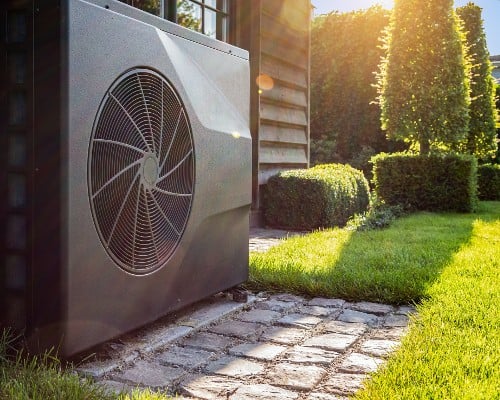When it comes to creating a welcoming home environment, selecting an air conditioning system that best meets your needs is of utmost importance. Two of the more commonly considered systems include forced air and central air systems, each offering unique advantages and drawbacks.
If you’ve found yourself wondering, “Should I opt for a forced or central air system?” Well, look no further! Here, we offer a thorough comparison of central air vs. forced air systems to help explain both their pros and cons.
Our aim? To assist you in making an informed choice that best meets your needs and enhances the comfort of your home. So, let’s dive right in and investigate these two systems!
Forced air vs. central air – What’s the difference?
Understanding the differences between these systems can be very helpful when it comes to cooling your home. Here is a handy comparison guide to assist with making an informed choice:
System design
Forced air systems work by pushing heated or cooled air through a series of ducts into different parts of your house. Its versatility enables it to provide both heating and cooling solutions.
Central air systems help create a cooler environment by extracting heat from the air, filtering out humidity, and dispersing cooled air through these ducts to each room in your home or building.
Energy efficiency
Central air systems tend to be more energy-efficient than forced air systems due to their ability to cool the entire home simultaneously, saving money from unneeded cooling in unoccupied rooms. With a forced air system, however, you can individually regulate the temperature in individual rooms – potentially saving energy if only cooling those rooms you use regularly.
Air quality
Forced air systems can spread dust and allergens throughout your home by drawing in outside air that may not be as clean. Central air conditioning systems often include enhanced air filtration capabilities to help improve the quality of air within your home.
Installation and maintenance
Installations for central air systems may be more complex and costly due to all of the ductwork necessary, making forced air a more affordable installation option. Maintenance for a central air system can be more involved since its various components need routine check-ups and cleaning.
Temperature control
Forced air systems typically provide better individual room temperature control than central air systems because they allow for zoning. Setting different temperatures for different areas of your home makes it more flexible in meeting individual comfort needs.
Remember – when choosing forced air vs. central air systems, you must consider your specific needs, lifestyle and budget. Consult a professional to understand which system will be ideal in your situation; if you require further guidance or have additional queries – don’t hesitate to give River Valley a call anytime!
Pros and cons of forced air systems
Now that we’ve broadly compared forced air vs. central air systems, let’s delve deeper into the specific advantages and disadvantages of forced air systems to further assist you in your decision-making process.
Pros:
- Quick and powerful: With their powerful air distribution mechanism, forced air systems can heat or cool a room rapidly. Meaning once you adjust your thermostat, you’ll feel the effects right away.
- Cost-effective installation: Forced air systems – in general – have a simpler installation process compared to central air systems. If your home already has the necessary ductwork installed, a forced air system can be more cost-effective to install.
- Temperature zoning: One major advantage of forced air systems over their central air counterpart is their ability to allow you to precisely manage temperature zoning between different rooms, giving you complete control of each temperature in each space.
This allows you to tailor temperatures according to the individual needs and preferences of occupants of each space.
Cons:
- Air quality: Forced air systems may disperse dust, allergens and other pollutants into the home’s atmosphere, negatively affecting indoor air quality.
- Noise: These systems can be a bit noisy due to the forced air circulation mechanism, which can be a concern if you prefer a quieter home environment.
- Inconsistent temperatures: Forced air systems can sometimes lead to uneven temperatures across different zones, especially in larger homes. You might find some rooms to be warmer or cooler than others.
Pros and cons of central air systems
This central vs. forced air comparison provides a thorough evaluation of the advantages and disadvantages of central air systems:
Pros:
- Improved air quality: Central air systems feature better air filtration ability, reducing the amount of dust, particles and allergens that circulate throughout your home. This can lead to better overall air quality and a healthier living environment.
- Energy efficiency: Central air systems can be more energy-efficient as they cool the entire home uniformly, reducing wasted energy on unoccupied rooms.
- Quiet operation: Central air systems are generally quieter than forced air systems. This means you can enjoy a comfortable temperature in your home without noise disturbance.
Cons:
- Higher installation cost: The installation of a central air system can be more complex and costlier, especially if your home doesn’t already have the ductwork necessary to facilitate installation.
- Maintenance: Central air systems have more components that need routine checking and cleaning, which can lead to higher maintenance costs over time.
- Limited temperature zoning: Unlike forced air systems, central air systems don’t typically offer the same level of individual room temperature control. This means you may not be able to adjust the temperature to suit individual comfort needs throughout your house.
Forced air or central air: Consult the professionals
In conclusion, when comparing forced vs. central air systems, each has its own set of pros and cons, and the choice largely depends on your specific needs, preferences, and budget. While forced air systems offer quick cooling, cost-effective installation, and temperature zoning, they may impact air quality and can be noisier.
When deciding between the two, central air systems offer improved air quality and energy efficiency while operating more quietly; however, installation may be more complex and costly and may not provide temperature zoning features that match those offered by central systems.
If you need assistance deciding which of these systems is best for you, it’s best to ask the pros. The River Valley Air Conditioning, Inc. team is here to offer more tailored advice if needed, so be sure to contact us to discuss how we can make your home as comfortable as possible!

